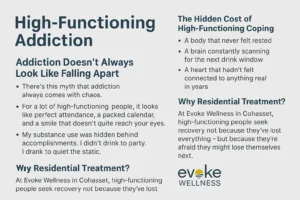I never missed a deadline. I kept my promises. I worked out five days a week, smiled at the front desk, and answered every email within 24 hours.
So when I checked into residential treatment, no one—not even me—was calling it addiction.
But behind the control was a quiet chaos. I wasn’t falling apart on the outside. I was just tired. Not the kind of tired sleep fixes. The kind that settles into your bones when you’ve been pretending to be fine for too long.
At Evoke Wellness in Cohasset, we see this more often than most people realize. High-functioning people seeking recovery not because they’ve lost everything—but because they’re afraid they might lose themselves next.
Addiction Doesn’t Always Look Like Falling Apart
There’s this myth that addiction always comes with chaos. Missed court dates. Burned bridges. Lost jobs.
But for a lot of high-functioning people, it doesn’t look like that. It looks like perfect attendance, a packed calendar, and a smile that doesn’t quite reach your eyes. It looks like having it together—except late at night when no one’s watching.
My substance use was hidden behind accomplishments. I didn’t drink to party. I drank to quiet the static. I drank to sleep. To show up the next day and perform again.
For a long time, I told myself: I’m fine. This is manageable. I don’t need help. I need to stay in control.
But the harder I tried to control it, the more it controlled me.
The Hidden Cost of High-Functioning Coping
You can be highly functional and deeply unwell at the same time. That contradiction is exhausting—and hard to admit.
I wasn’t afraid of losing my job. I was afraid of losing the version of me people admired. The version that always had answers, never needed a break, and definitely didn’t need help.
But underneath that performance was:
- A body that never felt rested
- A brain constantly scanning for the next drink window
- A heart that hadn’t felt connected to anything real in years
It’s not just burnout. It’s grief. Grieving a self that’s constantly edited for other people’s comfort. Grieving a life that looks good on paper but feels hollow to live.
Why Residential Treatment Was the Last Place I Wanted to Be
I hesitated. For months. I told myself outpatient was enough. I kept my sessions scheduled, logged on for therapy, and read the articles. I performed recovery the way I’d performed everything else.
But I couldn’t feel anything shifting.
Eventually, a colleague I trusted looked me in the eye and said, “You don’t need more willpower. You need a pause.”
That landed.
So I entered residential treatment in Massachusetts not as someone who’d lost everything—but as someone afraid they never really had it.
What I Found in Residential Care That I Couldn’t Find Anywhere Else
The first thing I noticed was quiet. Not just environmental quiet, though Cohasset has that. I mean nervous system quiet. The kind that comes when no one expects you to lead, prove, or please.
There was a schedule, yes. But it didn’t feel rigid—it felt supportive. I didn’t have to decide what healing looked like every minute of the day. Someone else had already built the frame. I just had to show up inside it.
What surprised me most wasn’t the therapy (though it helped) or the groups (though they moved me). It was how much I needed to be witnessed—just as I was.
No title. No perfection. No gold star for holding it together.
Connection Over Performance: The Real Shift
I remember the first time I shared something raw in group. Not a clever insight or a reframe—but a sentence I didn’t know I was going to say until it came out:
“I feel like I’m living someone else’s life.”
There was a beat of silence. Then someone nodded. Then someone else said, “Me too.”
And just like that, the spell broke.
Connection doesn’t require collapse. It requires truth.
In treatment, I started learning how to relate without performing. How to be seen without managing the impression. And slowly, how to let people close without numbing the fear that they’d leave.
You Don’t Have to Earn Help by Hitting Bottom
If you’re reading this, and your life looks “fine” but doesn’t feel fine—you’re not the exception. You’re not weak. And you’re not invisible.
Residential treatment isn’t just for crisis. It’s for clarity.
At Evoke Wellness at Cohasset, we meet people who function beautifully on the outside but feel broken inside. People who can lead meetings, care for others, and organize their lives—but don’t know how to rest, cry, or be known.
You don’t have to lose it all to ask for more.
What Happens After Residential Treatment?
The scariest part of healing isn’t leaving treatment. It’s facing life without the mask.
But if you do the work while you’re in a supportive, immersive setting, that transition gets softer. You’re not just “going back.” You’re moving forward with tools you didn’t have before.
For me, that looked like:
- Continuing therapy to protect my clarity
- Setting boundaries at work—even when it made me anxious
- Letting friendships deepen slowly, without over-explaining
The difference? I wasn’t chasing “balance.” I was learning to live without performing.
FAQs: Residential Treatment for High-Functioning People
Do I need to hit rock bottom to go to residential treatment?
No. That’s a myth. If your use is interfering with your peace, relationships, or sense of self—even if everything “looks fine”—you’re allowed to get help.
What if people find out I went to treatment?
Confidentiality is respected at every step. More importantly, you get to decide how, when, and if you share your experience. What matters most is that you’re okay with yourself.
Will I still be able to work while in treatment?
Residential treatment is immersive. It’s designed to remove you from external pressures so you can focus on healing. For many high-functioning clients, this short pause is what finally allows long-term clarity to take root.
Is this program just for severe addiction?
No. Our residential program supports a wide range of people—from those managing long-term substance use to those whose emotional lives feel unsustainable. If you’re questioning your relationship with control, perfectionism, or substances, you may be a fit.
Will I be out of place among other clients?
Not at all. Many of our clients are professionals, caretakers, or high achievers who simply can’t keep living the way they were. You’ll be in good company—and more understood than you expect.
You don’t need to crash to change.
Call 866-931-6429 or visit our Residential Treatment services in Cohasset, MA to find support that sees who you really are—even when you’re tired of pretending.





